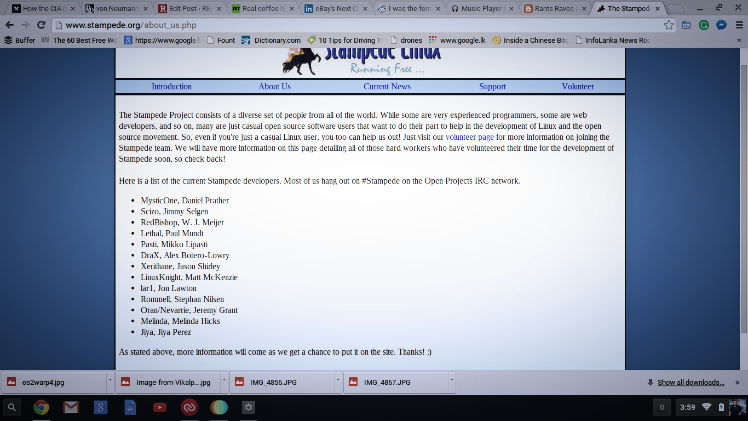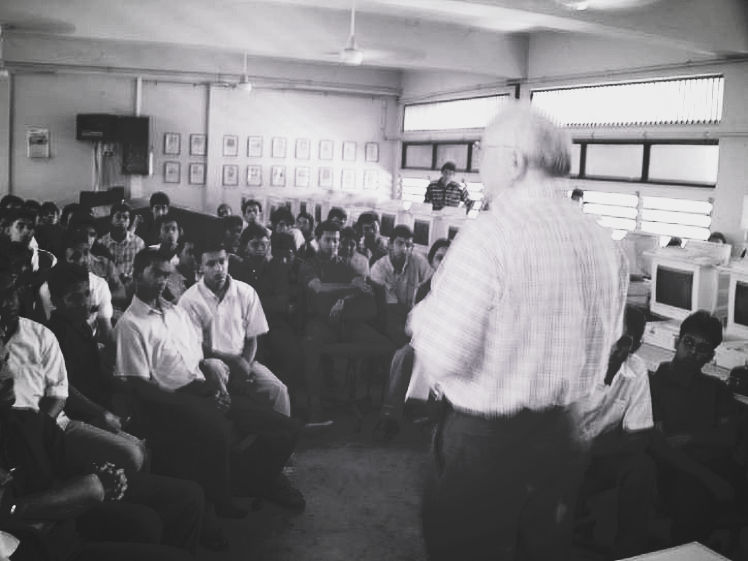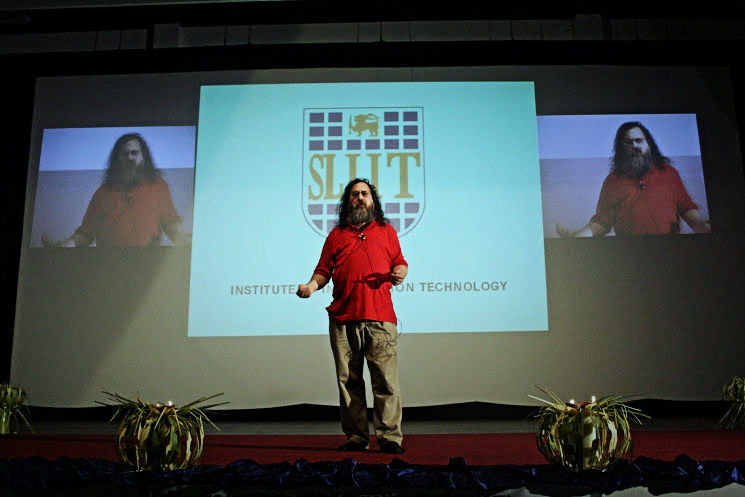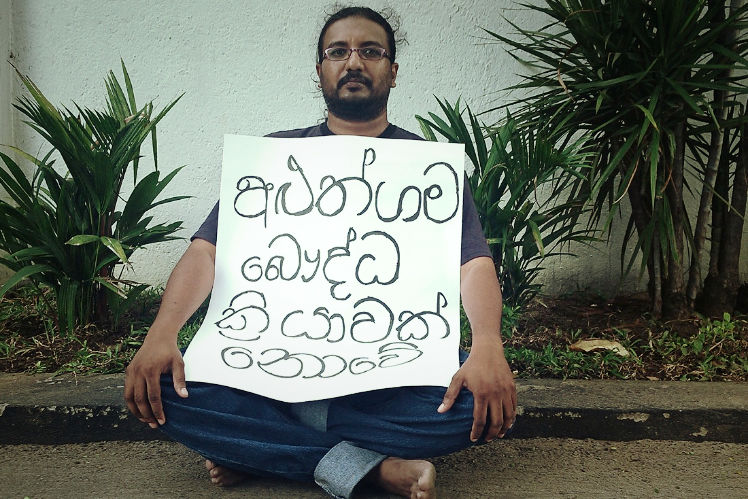Suchetha (or Such, as his friends call him) is a colorful character.
At any given gathering, he’s easy to pick out; he’s got long hair, a beard, walks barefoot, and generally looks like someone plucked out a hippie from the ’80s, gave him a Linux hat, and set him loose on the city of Colombo. His speech alternates between political puns and geekspeak laced with bits of Tolkien, Pratchett, and Goebbels. On occasion, he goes into activist mode (like when he conducted a one-man anti-BBS rally – see above– or exposed a flaw on the SLBFE servers and got threatened for it).
Underneath the wild demeanor, Suchetha is one of the most storied geeks in Sri Lanka. Suchetha is a wildcard FOSS advocate; he’s been hacking Linux and promoting it “since before it became a thing,” to quote him, and by and large, he’s always been one of the Sri Lankan Linux community’s most accessible characters. In fact, the very first time I got a Linux CD was in 2005, when Suchetha, standing behind a stall, started burning and tossing CDs to the crowd.
Suchetha’s rise and slow decline in fame – at least among our geeky Linux LAN-party circles – also corresponds to the rise and slow death of another entity: the Lanka Linux User Group (LK-LUG), which ten years ago was at the forefront of a massive push for open-source software – in homes, in offices, in government. Today, everyone’s (still) using Windows, and closed-source software is everywhere; only an arcane few use Linux. If anything, the Macbooks are spreading.
What happened?
“I got into Linux in the ’90s,” he says. “I was in Oklahoma City University. As soon as I went into university, I started hanging out with geeks. It was an amazing time to be there: one of the first serious conversations I had was about building a magnetic railgun-type launcher to eject stuff into space. We yammered about which direction it would have to face to achieve the optimal escape velocity. These weren’t the kind of things you discussed in Sri Lanka; here you discussed jobs, who was marrying when, and so on. It was so awesome. People still don’t understand geeky stuff.
Linux was a natural switch, because in uni you experiment with alternate lifestyles – or in our case, with alternative operating systems. We had Windows; in 1997 – or thereabouts – a guy brought over a bootleg copy from Russia. It was a massive 16 Megabytes. We didn’t have CD drives: that was Oh My God technology back then, just like virtual reality headsets now. I installed Windows 95 off 35 floppies.
Our hatred for Windows – it was hatred – really kicked off with OS 2, Warp 4. IBM’s OS, which shipped on a machine called the PS/2, was far ahead of Windows. It had voice recognition that ran on a Pentium processor and actually worked; it had the original NTFS. This was in 1997. It could have destroyed Windows, but a court case ruled that while Windows was allowed to be on IBM PCs by default, they could only supply OS/2 as a separate install. Imagine how different the world would have been. It also helped that all the computers ran Microsoft software, but if you wanted to email you had to use Telnet to login into a UNIX server.”
Frustrated, Suchetha found Slackware, then found Stampede Linux. It was an OS you could carry around on a single floppy, so he carried it around on a single floppy. “That was so fucking cool,” he enthused. “You could do that with DOS as well, but screw DOS.”

Then, presumably still with his floppies, he came to Sri Lanka, just in time for the birth of the Lanka Linux User Group.
Sri Lanka, and all that followed.
It was 1998. Dr. Ruwan Weerasinghe, Buddhika Siddisena, Anuradha Ratnaweera, and a few other guys had started getting together at Peradeniya University. Dr. Ruwan was a geek; he was in charge of systems administration at the Peradeniya campus.
In 2004, Suchetha found out that the Linux group that was holding a Software Freedom Day. There was a tiny article in the Daily News proclaiming that such-and-such was going to happen. Someone on Slashdot asked, “So, what happened?’ and I replied saying that I didn’t see anything happening.
Anuradha Ratnaweera saw that post on Slashdot and emailed Suchetha, asking him to join the next meetup, at the book fair. There, Suchetha met the old guard; Anuradha, Buddhika Siddhisena, Anuradha Weeraman, Bikkhu Mettavihari, Dharmendra Pradeepa. There were about thirty people in the group. The Bhikkhu had arranged for the stall at the Book Fair.
“That year, and the year after, was bad for the country (tsunami) but good for FOSS. 2004 was the year Dr. Sanjiva Weerawarana founded FOSS.lk (the Lanka Software Foundation had been up for years), and things escalated rapidly. The tsunami hit; the Linux group helped build Sahana, and that really opened people’s eyes up to the possibilities.”

“I wasn’t programming – I was always more the person users would call when they needed to set up Linux on their PCs. We saw a massive awareness thing happening. Greg Stein, Google’s Python guru, came down. Rasmus Lerdorf, the guy who made PHP, became an evangelist. Danise Richards, the open-source diva from IBM (according to her business card), came in. FOSS.lk took off. Redhat was making a push into Sri Lanka.”
2006 and 2007 were even more successful. Suchetha and a team of Linux geeks started touring schools, teaching teachers how to Linux. “Those four sessions were merely training for what we were REALLY going to do. Two days at Ambalangoda, two more at Matara and two at Kalutara. All three of which went off very smoothly thanks to the good works of the teachers there.” reads his blog. And another, later, lists 28 schools from Colombo to Matara, a tour teaching Linux. The tour ended with FOSSSL ’06, that great meeting of geeks.
“ICTA was pushing hard with their FOSS-ED project,” recounts Suchetha. “FOSS for government agencies, FOSS for business, education – those were heady days. We were working with ministries instead of being lone geeks talking distros. By this time, we had the Linux center – a huge location in Nugegoda rented out to us: 4 bedrooms, 3 bathrooms, the perfect meeting place-slash-den for Linux guys. Apache stepped in to help, too. We thought we could take on the world.”
Suchetha pulled many stories out of his (proverbial) hat, and I’m sure I missed most of them. There was IT Times, the magazine from Wijeya newspapers that shipped with MEPIS Linux CDs; the surgeon who taught himself Linux and Python to write a patient management system for his hospital; another who bought a PalmTop and walked it wanting to install Linux on it. They toured Buttala and Trincomalee, trying to get the government to buy into the FOSS mantra. “That,” he told us emphatically, “was the quality of people we had. They had this fire in their eyes.”

By that time, the second generation of Linux geeks was growing up. People were coming into the Lanka Software Foundation from as far as Ampara and Trincomalee, bringing their talent with them. Sinhala input systems arose from the research the geeks in Trincomalee and other areas had done on devising input systems for Tamil. In 2008, Richard Stallman, the software freedom activist, founder of GNU and the Free Software Foundation, and the recipient of some 13 doctorates, came down to Sri Lanka, pissing off some people and delighting many others. His visit was celebrated by every hardcore geek in the vicinity.
But perhaps the occasion was a harbinger of doom, for after that, things began to go downhill.
The plunge
By 2008, they were losing both money and people.
Suchetha never elaborated how the money worked out, but the people factor was key. War was escalating, and tensions were rising. Someone spread the rumor that the Lanka Software Foundation was training LTTE cadres in technology. Few people took this rumor seriously, but Tamil members began to feel unwelcome, and some of the best and the brightest – anyone who could leave, really – left the country. Many of the others started dropping off; it was time for them to marry and raise families of their own.
One by one, things started going wrong. The mail server fried and the mailing list went down with it; they had kept no backups. Then Google happened – or at least, it took over the prime reason for the Lanka Linux User group to exist: knowledge.
“Google gave everyone the answers,” pointed out Suchetha. “Maybe it took a while, but eventually the public content got there and no one needed to ask the Linux User Group for anything. That’s what lead to the death. Not due to enthusiasm. Linux is still the hacker OS. “Aiya how can you become a hacker?” is still a question people ask me. Google really took down user groups in a massive way.”

“Other LUGs around the world survived by becoming more social; these were the LUGs that met regularly. We met for events; in fact, the greatest meeting in LKLUG history was in 2006 or early 2007, for Anuradha Ratnaweera’s wedding. Today, the people are still around, but now LUG only exists in people’s heads. We weren’t necessary anymore. We used to get phone calls almost every day – now you don’t need a knowledge hub around.”
They moved out of the house in Nugegoda in 2011. The last post on www.opensource.lk dates from that time. They list projects that they were working on at the time – including a P2P web caching program and an open-source nano-structure modeling program called Ninithi. The projects seem to have died out since then.
Where is Linux going today? I ask the man who lost out to a search engine.
“Ubuntu has helped a lot,” said Suchetha, after some thought. “Linux has problems; it always has; it’s always been the geeky OS, the underdog.
But Ubuntu is making Linux more accessible. Valve is porting more games to Linux. The Steambox has people talking about Linux again. Linux, in my opinion, will always be at the front end of what the hell can we do; that’s its nature. Apple will follow with their UI and design chic and then Microsoft will come around something that works for the 99%.
In Sri Lanka? I’d love to see the LK LUG rise again, but I doubt we’ll ever be as strong as we used to be.”




GIPHY App Key not set. Please check settings